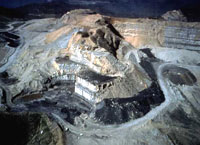Enviros in Washington are apoplectic over what they fear will be a pre-Earth Day cave-in by the Clinton administration over mountaintop-removal mining in West Virginia.
Readers may recall this battle from last year’s appropriations season, when powerful Sen. Robert Byrd (D-W.Va.) introduced a rider that would have bypassed a federal judge’s ruling against the destructive mining method. The judge found that blasting the tops off mountains to get at coal deposits and then dumping the debris in nearby streams violates the Clean Water Act, not to mention the Surface Mining Control and Reclamation Act.
The rider didn’t fly. But now enviros fear Byrd’s campaign is picking up steam again. Word is that the administration may file a brief on Monday supporting West Virginia in its appeal of the federal judge’s ruling.
Some 21 groups signed a letter dated yesterday imploring the administration to stand firm against mountaintop-removal mining. That letter followed one sent to the White House last month by 23 moderate Republicans concerned that the administration was about to “undermine the environmental protections offered by the court’s decision” and “threaten the integrity of the federal laws at issue.” (More on the GOP letter in Daily Grist .)
When Republicans are complaining to the White House about threatening the integrity of federal environmental laws, you know you are through the looking glass.
Courtney Cuff, legislative director at Friends of the Earth, said that several enviros have recently requested an emergency meeting with White House Chief of Staff John Podesta to discuss the matter but have gotten no response.
The White House did not immediately return Muckraker’s call for comment.
One thing that has enviros nervous is a 1996 comment from Interior Secretary Bruce Babbitt that appears on the website of Arch Coal Inc., one of the largest coal producers in the country.
“In some ways it is a better landscape than it was before [mining],” Babbitt said upon visiting a site in southern West Virginia that was reclaimed after mountaintop-removal mining. “It is a more diverse landscape — a savanna of forests coming back, of fields, of open spaces. It is probably in some ways closer to the landscape that existed here a thousand years ago with all its diversity and richness and water fowl and deer and big game and wildlife.”
Cuff said she was still holding out hope that the administration would not cave. But if they do, she said, Vice President Al Gore likely won’t hear the end of it.
“Is this the sort of lands legacy the administration wants to leave?” Cuff asked. “Ruined mountains and a wrecked environment?”
Rocky Mountain High
As promised, we continue our region-by-region political tour of the United States. This week’s stop: the Rocky Mountain West.
Nevada: All politics is nuclear this year in the Silver State, where the proposed Yucca Mountain nuclear waste dump colors the campaign canvas, particularly the race for the seat of retiring Democratic Sen. Richard Bryan.
Both Democrat Ed Bernstein and former Republican Rep. John Ensign, the likely fall combatants for the seat, oppose the dump. But Ensign argues that it would be better for state voters to elect a Republican who, assuming the GOP retains control of Congress, would presumably be in a better position to influence the final decision on the issue.
Republicans on the national scene view Ensign, who narrowly lost to Sen. Harry Reid (D) in 1998, as one of their top prospects to steal a Democratic Senate seat. They are not going to let him get defined — as he did in 1998 — as a closet supporter of the dump. If Bernstein makes that claim, look for an immediate television response.
The other race to watch in Nevada is for Ensign’s old Las Vegas-based House seat, won by moderate Democrat Shelley Berkley in 1998. Democrats are confident the well-funded Berkley will cruise to reelection, but the GOP is not writing off the seat entirely.
State Sen. Jon Porter, the leading Republican candidate in the Sept. 5 primary, has a bit of a problem, however, in that he is raising money with help from national Republican House leaders who support the waste dump. Democrats are certain to make an issue of that in the fall.
Colorado: A pair of good House races highlight the political year in a state that is also considered something of a presidential battleground (the only one in the Rockies), though Texas Gov. George W. Bush has the advantage as he does elsewhere in the region.
In the Boulder-based 2nd district, first-term Democrat Mark Udall, inheritor of a family tradition of environmental activism, is favored for reelection but may not get a free ride. The good news for Udall is that his 1998 foe, Bob Greenlee, opted not to run, saying he’d prefer to wait until 2002 when the race may prove more appealing in the wake of redistricting.
Carolyn Cox, a Colorado businesswoman, is the only announced Republican in the 2nd district, but the GOP hopes Boulder County Treasurer Sandy Hume will get in the race as well. The primary is Aug. 14.
One of the best races in the Rocky Mountain region will take place in Colorado’s 6th district in the Denver suburbs, home to Columbine High School, where Democrats think they have an excellent chance of taking out gun-control foe Tom Tancredo.
Tancredo’s likely opponent, businessman Ken Toltz, is already going after the first-year Republican, accusing him of urging that gun control votes be pushed back in Congress until after the April 20 anniversary of the Columbine shootings. Tancredo has denied the charge and in turn accused Toltz of playing politics with tragedy.
Idaho: The only question here is which Republican will inherit the seat of ultra-conservative Rep. Helen Chenoweth-Hage, who is honoring a term limits pledge and stepping down.
Leading the GOP field are Lieutenant Gov. Butch Otter (more about Otter here), former Republican state Chair Ron McMurray, and conservative activist Dennis Mansfield. Idaho’s primary is May 23.
Montana: Two close statewide races are shaping up in Big Sky country this year and Democrats have a shot at restoring themselves to respectability in the state after several years in the political wilderness.
The battle for the state’s lone House seat, being vacated by Republican Rick Hill, seems likely to pit state Superintendent of Public Education Nancy Keenan, a Democrat, against former Lieutenant Gov. Denny Rehberg, who was the GOP nominee against Sen. Max Baucus in 1996.
Keenan is the slight favorite based on her statewide name identification and popularity, but Montana is a generally conservative state and Republicans think they can paint Keenan as too liberal.
The governor’s race should be equally tight with a handful of Democrats and Republicans competing for the nominations to replace popular, but term-limited, GOP Gov. Marc Racicot. Leading Democrats for the June 6 primary include state Auditor Mark O’Keefe and Attorney General Joseph Mazure
k. The leading Republican is Lieutenant Gov. Judy Martz.
Republican Sen. Conrad Burns is also up for reelection in Montana this fall and is slightly less than a sure thing. Democrats competing in the June 6 primary include rancher Brian Schweitzer and former state House Speaker John Driscoll, with Schweitzer the favorite.
Utah: Democrats will once again make a run at Rep. Merrill Cook, whose mercurial personality and rocky relationships with former campaign staff members (one is suing him for unpaid bills) make him a perennial target.
Cook will likely face businessman Jim Matheson, son of former Gov. Scott Matheson, in the general election, but he will have to get past a primary challenge from venture capitalist Jeff Wright first.
Wyoming: Fuhgedaboutit. Republican Rep. Barbara Cubin is the only one up and she won’t break a sweat.
Next week: the Southwest.
Nothin’ Could Be Finer Than Two Candidates in Carolina
The Sierra Club has taken the courageous step of endorsing not one but two Democrats in the North Carolina gubernatorial primary.
So green did the group find Lieutenant Gov. Dennis Wicker and Attorney General Mike Easley that it simply couldn’t choose between them.
Greg Lytle, political director of the group’s North Carolina chapter, explained the bold and decisive move this way to the Raleigh News and Observer: “Wicker and Easley clearly stood above the other candidates in their commitment to such key environmental issues as smart growth, clean air, clean water, and forestry policy … Because both these two candidates have made the environment a centerpiece of their campaigns, we feel they both merit the Sierra Club’s support.”
Muckraker’s suggestion: North Carolina Democrats should attempt to vote for both Wicker and Easley in the May 2 primary. North Carolina’s current governor, Democrat Jim Hunt, is term-limited.
Caught on Tape: Arrested in the Arctic!
Greenpeace activists, not known for their aversion to handcuffs, braved 50-below wind-chill temps in Alaska this week to protest BP Amoco’s construction of a new oil pipeline in the Arctic.
Four Greenpeacers were arrested Monday including one who climbed out onto a pipe-laying backhoe and unfurled a “Stop BP’s Northstar” banner. A fifth arrest was made on Tuesday as Greenpeacers towed a fiberglass dome (containing two activists) into the construction area.
Check out video of Wednesday’s protest on the Greenpeace website and learn why Greenpeace thinks the pipeline is a bad and dangerous idea.
Muckracker’s favorite part of the video is not the actual scaling of the BP equipment (though that is pretty cool) but the amazing jump the activists take in their snowmobile as they race across the tundra. The video is punctuated by shouts of amazement, presumably from the camera operator, as the snowmobile rockets into the air. This is a truly commendable use of the Internet in environmental activism.
And Speaking of Protests …
So far, Muckraker’s hometown has not seen the sort of street chaos that greeted ministers of the World Trade Organization in Seattle recently. But all that could change by the weekend.
Activists are beginning to flow into Washington, D.C., to protest at meetings of the World Bank and the International Monetary Fund scheduled for Sunday and Monday, pointing out what they see as the labor injustice and environmental degradation fostered by unfettered global trade.
So far there have been just a handful of arrests, some after activists shut down a major thoroughfare in front of the World Bank on Monday, as well as several street closings. (More on this in Daily Grist.)
The heat could rise significantly when activists actually try to block meetings from taking place Sunday and Monday.
Muckraker has a sneaking suspicion, however, that the multifarious police presence in this city (Metro Police, Park Police, Capitol Police, Secret Service, et al.) will probably have a bit more of a clue about how to handle demonstrators than did their counterparts in Seattle. (Read a Washington Post op-ed on how the cops might approach this weekend’s protests. And watch the action unfold yourself on Protest Cam.)
Muckraker will be on scene to report any major uprisings in next week’s special Earth Day 2000 edition.



